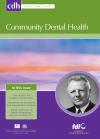Community Dental Health

- Cover Date:
- June 2006
- Print ISSN:
- 0265 539X
- Vol:
- 23
- Issue:
- 2
Improving access to dental care in East London’s ethnic minority groups: community based, qualitative study
There are few studies of access to dental care in ethnic minority groups which have compared their ï¬ndings with those reported by the general adult population. Furthermore, studies have focused on either the younger or older members of these communities. Aim: this study aimed to identify barriers to the uptake of primary dental care in East London, to identify any variation in responses from the general adult population and to report ideas to improve access to primary dental care expressed by the participants. Methods: a qualitative study using community based participatory methods was adopted. Data were generated through purposefully sampled focus groups and analysed using a grounded approach. Setting: East London (UK), 2001. Participants: 68 volunteers aged 18-40 years, from the Bangladeshi, Indian, Black Caribbean communities and general adult population. Results: three inter-related themes were found to influence views on access: the structure of primary dental care, cost and anxiety. There was little evidence of differences in barriers to access based on ethnicity alone, reflecting the role of factors such as social class. Adult volunteers with young families enabled a wider perspective on barriers to access to be achieved, particularly with respect to the impact of the cost of dental care on family budgets. Proposals for reducing the barriers to accessing primary dental care were identiï¬ed. These addressed a perceived need to extend services through outreach activity, develop communication skills within primary dental care practice and liaise with other primary health care services. Conclusion: this focus group study has conï¬rmed the existence within East London’s ethnic minority groups of barriers to accessing primary dental care reported within the general population for some time. That these responses are alike may be accounted for by the common levels of social disadvantage experienced. The rapid appraisal process enabled the identiï¬cation of proposals to reduce access barriers. These are being implemented and their effectiveness in reducing barriers to accessing primary dental care remains to be established.
Key words: access, barriers, ethnic minorities, focus groups
- Article Price
- £15.00
- Institution Article Price
- £
- Page Start
- 95
- Page End
- 100
- Authors
- Ray Croucher, Ratna Sohanpal
Articles from this issue
- Title
- Pg. Start
- Pg. End
- Service quality implications of dental undergraduate outreach teaching for Primary Care Trusts in England, UK.
- 75
- 79
- Improving access to dental care in East London’s ethnic minority groups: community based, qualitative study
- 95
- 100
- The unequal burden related to the risk of oral cancer in the different regions of the Kingdom of Saudi Arabia
- 101
- 106
